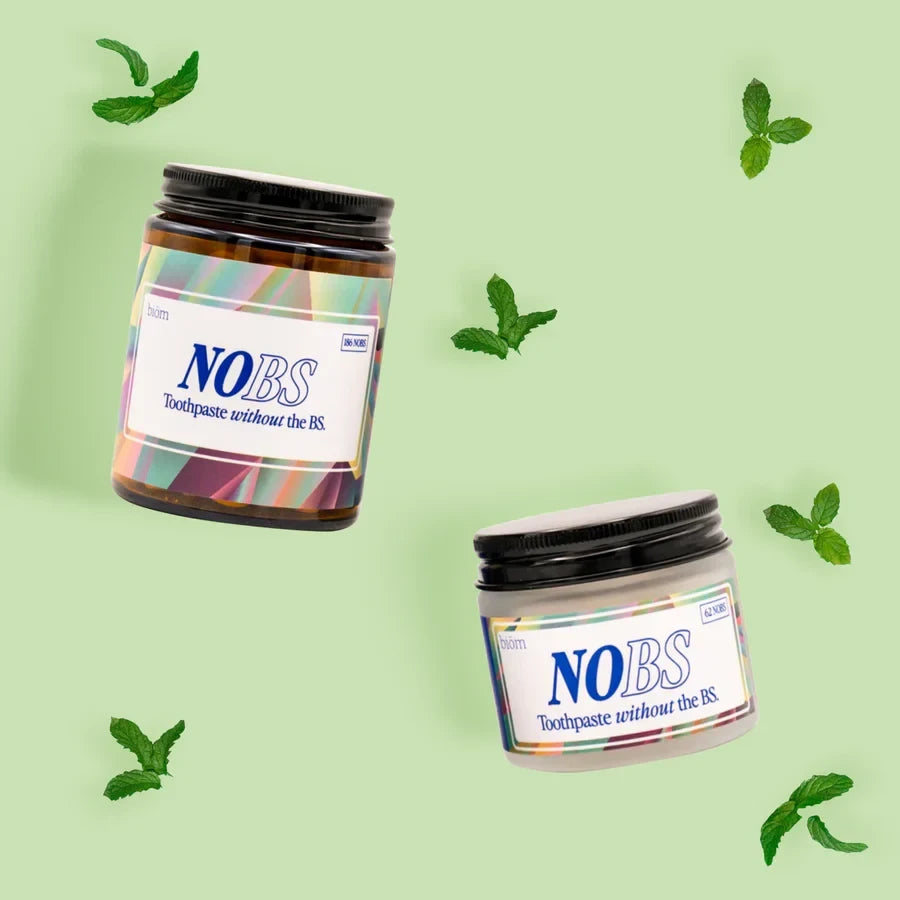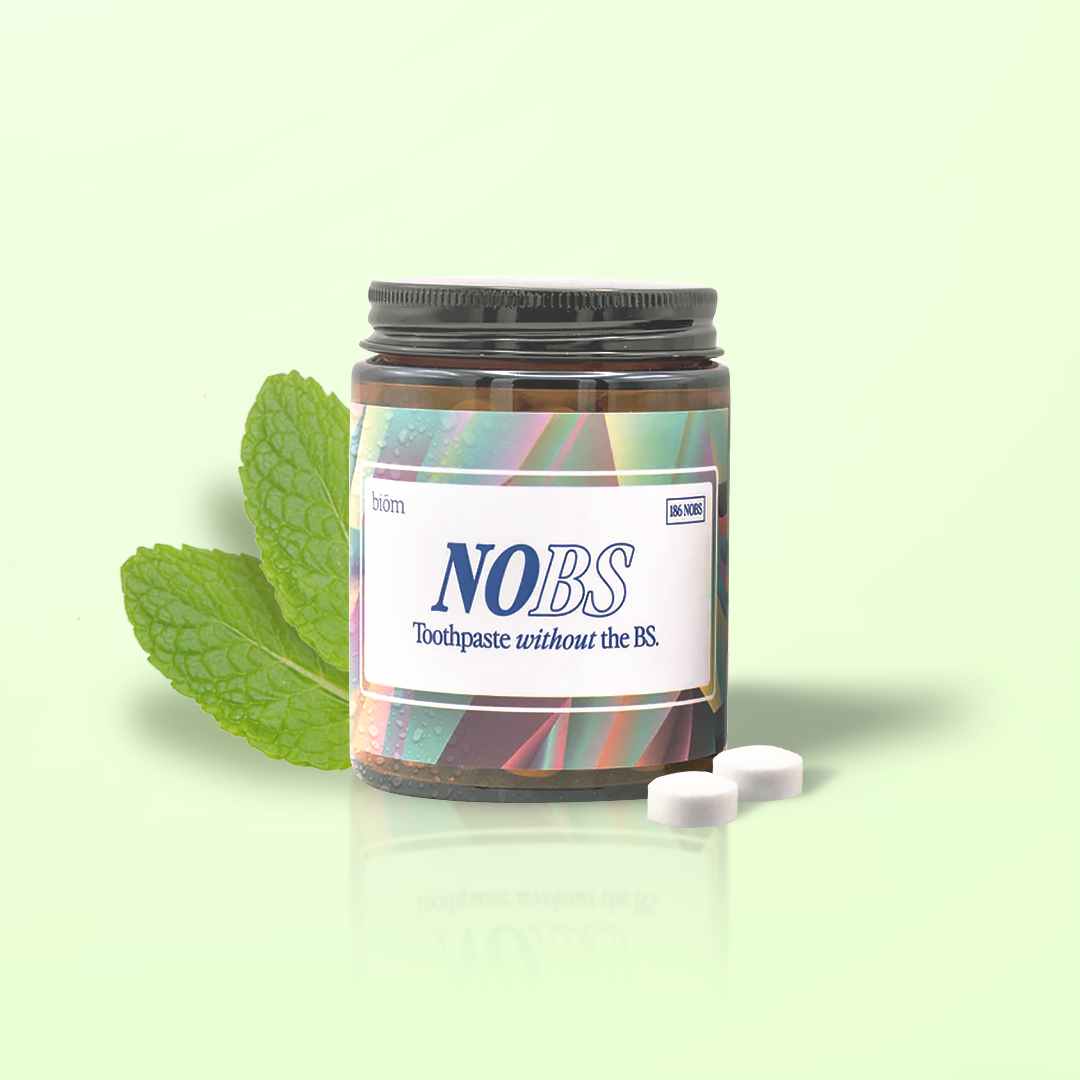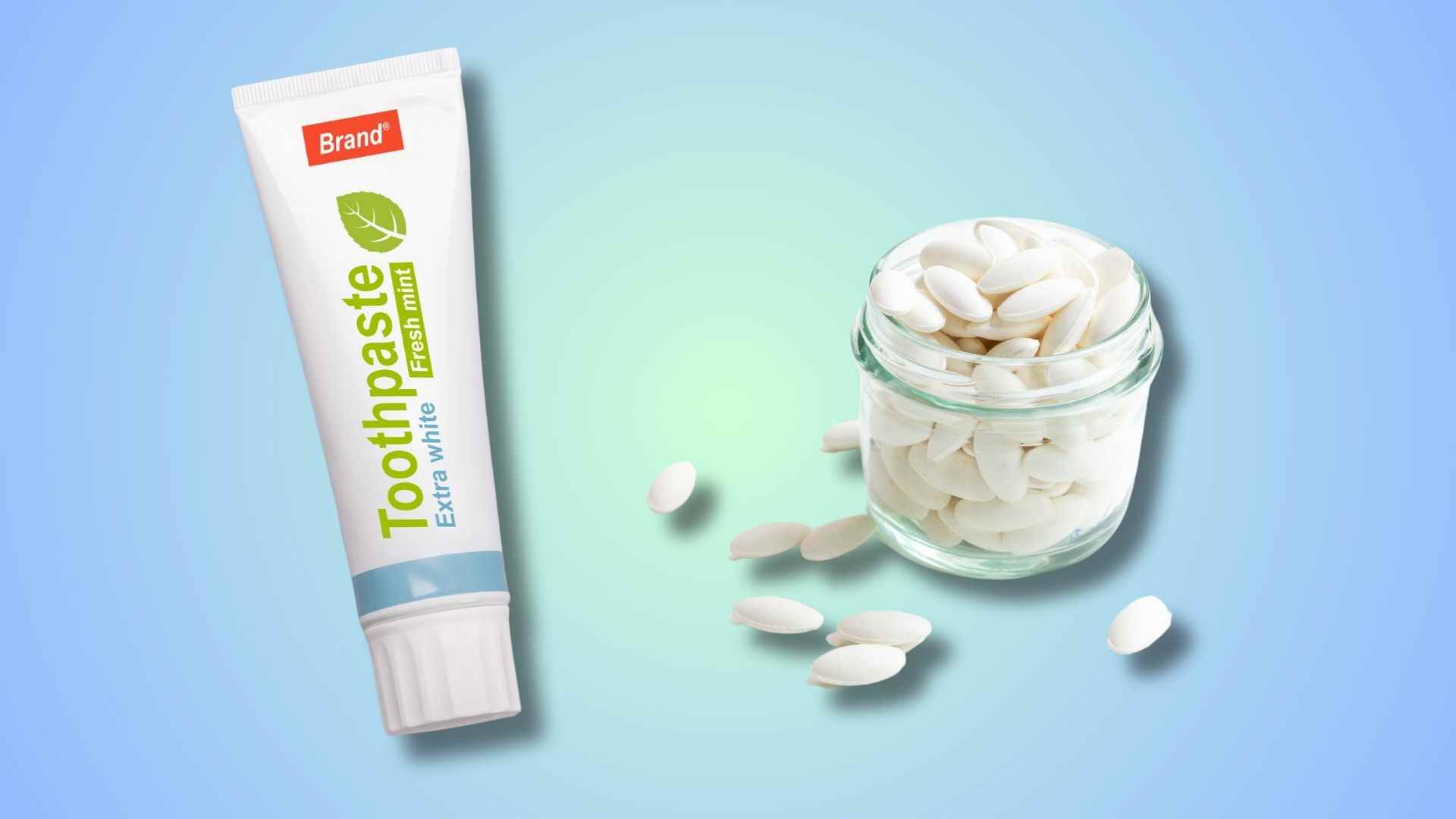What is Xylitol in Toothpaste?
Xylitol in toothpaste is a sugar alcohol used as a natural sweetener and for its oral health benefits. Unlike traditional sugars, xylitol does not feed the bacteria in your mouth, which means it doesn't contribute to tooth decay.
In fact, xylitol actively fights against cavity-causing bacteria, like mutans streptococci, and can prevent tooth decay by inhibiting their growth and reducing their ability to create acids that erode our enamel.
This lowers our risk of developing dental caries and promotes good dental health. That said, xylitol cannot reverse cavities.
Further, xylitol stimulates saliva production, which is beneficial for our oral health. Saliva is our natural buffer against acids that can otherwise demineralize enamel and cause tooth decay.
Because of these properties, xylitol is considered one of the best ingredients in toothpaste. Plus, its naturally sweet taste also makes toothpaste more enjoyable use to without the harmful effects of sugar, making it a popular choice for both adults and kids toothpaste.
In this article, I'll explain everything you need to know about xylitol in toothpaste.
So, what is xylitol toothpaste?

Xylitol toothpaste is a type of dental care product that incorporates xylitol as a key ingredient. Why xylitol?
Well, xylitol is a natural sugar alcohol known for its sweetening properties and oral health benefits. Unlike traditional sugars, xylitol doesn't contribute to cavities. Instead, it actively combats the growth of cavity-causing bacteria in our mouths, particularly Streptococcus mutans.
This is the bacteria is responsible for producing the acidic by-products that lead to tooth decay. Xylitol works by inhibiting these bacteria, thereby reducing plaque formation and lowering your risk of dental cavities.
In addition to its antibacterial properties, xylitol also enhances saliva production, which is important for maintaining oral health. Increased saliva flow helps neutralize acids in our mouths, wash away food debris, and facilitates enamel remineralization, which can further protect against demineralization decay.
In addition to toothpaste, you can also find xylitol chewing gum and breath mints which can fight tooth decay.
Does xylitol toothpaste work?
Yes, xylitol toothpaste works effectively for several reasons related to our oral health. Xylitol, a natural sugar alcohol found in many fruits and vegetables, is used in toothpaste primarily for its ability to combat cavity-causing bacteria and promote saliva production.
You see, unlike regular sugar, xylitol doesn't feed the harmful bacteria in your mouth. Instead, it inhibits the growth of Streptococcus mutans, the key bacteria involved in tooth decay and plaque formation. By reducing harmful bacteria, xylitol helps decrease your risk of dental cavities.
Further, xylitol increases saliva production which plays a key role in neutralizing acids produced by bacteria, washing away food particles, and supporting remineralization. This natural process protects us against tooth decay and strengthens teeth.
Additionally, because xylitol is a sweetener, it makes toothpaste more palatable without the negative effects of sugar, enhancing the appeal of brushing. That said, xylitol is good for your teeth but does not whiten teeth.
Finally, studies have shown that regular use of xylitol-containing toothpaste can lead to a significant reduction in tooth decay and improvement in oral hygiene.
What does the research on xylitol toothpaste say?

Research on xylitol toothpaste shows that it has positive outcomes for oral health, particularly when it comes to reducing your risk of cavities. Here are four of the most important research findings regarding the benefits of xylitol in toothpaste:
-
Cavity Prevention: Studies have demonstrated that xylitol inhibits the growth of Streptococcus mutans, the primary bacteria responsible for tooth decay. Xylitol's unique structure allows it to interfere with bacterial growth and acid production, reducing the risk of cavities.
-
Saliva Stimulation: Xylitol has been shown to stimulate saliva production, which is beneficial for our oral health and works by neutralizing acidity and protecting our enamel. This action helps protect against tooth decay and strengthens teeth.
-
Remineralization of Tooth Enamel: Research suggests that xylitol can enhance the remineralization process of tooth enamel, potentially reversing early signs of tooth decay. Interestingly, a study in "Caries Research" indicated that xylitol, when combined with remineralizing toothpaste, offers a synergistic effect that enhances the remineralization of enamel.
-
Reducing Plaque Formation: Xylitol has been associated with a reduction in plaque formation on teeth. Since it doesn't serve as a food source for oral bacteria like traditional sugar does, its use in toothpaste can lead to less plaque buildup and a lower risk of periodontal diseases.
Of course, it's important to note that xylitol toothpaste works best when used in conjunction with regular use of expanding floss, alkaline mouthwash, and tongue scrapers.
Benefits of Xylitol Toothpaste
Xylitol offers many benefits for our oral health, making it a standout ingredient in toothpaste and other dental care products. Let's walk through 5 of the most important benefits together.
Prevents Cavities
One of the most celebrated benefits of xylitol is its ability to prevent cavities.
Xylitol works by inhibiting the growth of Streptococcus mutans, a cariogenic bacteria primarily responsible for tooth decay. Unlike regular sugars that feed harmful oral bacteria, xylitol can't be metabolized by these bacteria, thereby reducing their growth and the acids they produce that wear away at enamel.
Research suggests that regularly using xylitol toothpaste can significantly lower your risk of developing dental cavities, offering a proactive approach to oral health.
Reduces Plaque
Plaque buildup is a major contributing factor to dental health issues, including cavities and gum disease. Thankfully, xylitol is known for its ability to reduce the amount of plaque-forming bacteria in our mouths.
Since xylitol doesn't serve as a food source for these bacteria, their ability to stick to teeth and form plaque is diminished. This process helps keep your teeth cleaner and healthier, reducing the likelihood of oral health problems down the line.
Enhances Saliva Production
Saliva is a natural defense mechanism against tooth decay, and xylitol helps enhance its production. By stimulating saliva flow, xylitol helps neutralize acids in the mouth, washing away food particles, and keeping the mouth moist.
This increased saliva production is particularly beneficial for those of us suffering from dry mouth, a condition that can increase the risk of tooth decay and gum disease.
Remineralizes Teeth
Remineralizing teeth is one of the most important benefits of xylitol. Your saliva, stimulated by xylitol is rich in important minerals like calcium and phosphate which your body uses to remineralize, repair, and strengthen your enamel.
This process not only reverses tooth decay but also fortifies your teeth against future erosion.
Tastes Great
Beyond its health benefits, xylitol is naturally sweet and adding it to toothpaste makes it more enjoyable to brush with, especially for children and those who are sensitive to the taste of traditional toothpaste.
This pleasant taste encourages regular brushing and contributes to better oral hygiene without the negative effects of sugar.
Side Effects of Xylitol Toothpaste

While xylitol toothpaste is widely regarded for its oral health benefits, there are a few potential side effects to be aware of. Let's walk through some of the potential consequences of xylitol, largely related to gastrointestinal effects and its impact on individuals with certain sensitivities.
Gastrointestinal Discomfort
Xylitol can cause gastrointestinal discomfort for some people, especially when swallowed in large quantities.
This is because xylitol is a sugar alcohol, which can be difficult for the body to digest if consumed in significant quantities. Symptoms may include bloating, gas, and diarrhea.
However, the amount of xylitol present in toothpaste is typically small, and since you don't ingest toothpaste, this side effect is more commonly associated with xylitol in food products rather than in dental care products.
Allergic Reactions
Although rare, some individuals may experience allergic reactions to xylitol. Symptoms could include itching, swelling, or irritation in the mouth or throat.
Anyone known to have allergies to sugar alcohols or specific sensitivities should proceed with caution and consul their dentist if they suspect an allergic reaction to xylitol toothpaste.
Toxicity in Pets
It's important to note that while xylitol is safe for human use, it is highly toxic to dogs and certain other pets. Even small amounts can cause hypoglycemia (low blood sugar), seizures, liver failure, or even death in dogs. Therefore, you should keep products containing xylitol, including toothpaste, out of reach of pets.
Xylitol vs Fluoride Toothpaste
Xylitol toothpaste and fluoride toothpaste serve different functions in oral health.
Xylitol toothpaste primarily targets the reduction of harmful bacteria in the mouth, such as Streptococcus mutans, which are known to cause cavities. By inhibiting these bacteria's ability to stick to teeth and metabolize sugars into acids, xylitol effectively reduces plaque formation and your risk of tooth decay.
Fluoride toothpaste, on the other hand, works by strengthening the tooth enamel, making it more resistant to acid attacks from bacteria. It helps repair early tooth decay through remineralization, a process that restores essential minerals to the enamel. Fluoride has been extensively studied and is widely recognized for its role in preventing cavities and tooth decay, making it a staple in dental care.
However, many individuals may choose to avoid fluoride due to personal health concerns or preferences for natural products, such as nano hydroxyapatite toothpaste.
Thankfully, with NOBS Toothpaste Tablets, you don't have to choose between xylitol and remineralization. NOBS incorporates both xylitol and nano hydroxyapatite, a safe and effective alternative to fluoride, in easy-to-use, effective toothpaste tablets.
Is xylitol toothpaste as effective as fluoride toothpaste?
No, in terms of remineralization, xylitol toothpaste is not as effective as fluoride toothpaste.
The fluoride in toothpaste facilitates the remineralization process, where lost minerals are restored to enamel, making it more resistant to acid attacks from bacteria. This action not only helps repair early stages of tooth decay but also prevents new cavities from forming.
On the other hand, xylitol toothpaste offers a different approach for our oral health, focusing on reducing the levels of harmful bacteria in your mouth. By inhibiting the growth of bacteria like Streptococcus mutans, known for causing tooth decay, xylitol indirectly helps decrease the risk of cavities indirectly. It also promotes saliva production, aiding in neutralizing acids and providing some remineralization benefits.
So, while xylitol toothpaste can be beneficial for oral health, it doesn't directly strengthen the enamel like fluoride does. If you're considering the most effective way to prevent cavities and strengthen your teeth, fluoride toothpaste has the edge.
That said, because nano hydroxyapatite is just as effective as fluoride at remineralization, the best toothpaste to pick is nano hydroxyapatite toothpaste with xylitol.
Should I switch to xylitol toothpaste?
Yes, you should switch to xylitol toothpaste tablets. Switching to a xylitol toothpaste that includes a remineralizing agent like nano hydroxyapatite can be a great decision for your oral health, especially if you're looking for a product that combines the antibacterial benefits of xylitol with the enamel-strengthening properties of nHA.
Xylitol is effective at reducing harmful bacteria in the mouth and promoting saliva production, which helps in maintaining a balanced oral environment. The addition of nano hydroxyapatite, a biomimetic material similar to natural tooth enamel, enhances the toothpaste's ability to repair minor enamel scratches and contribute to the remineralization process, making your teeth stronger and more resistant to decay.
Is xylitol toothpaste safe for children?
Yes, xylitol toothpaste for kids is safe and can be a beneficial addition to their oral hygiene routine.
Xylitol is a natural sweetener that not only makes the toothpaste more palatable for children but also offers oral health benefits. For example, unlike sugar, xylitol doesn't contribute to tooth decay.
Instead, xylitol helps reduce the levels of decay-causing bacteria in our mouths and can decrease your child's risk of cavities. Further, xylitol's ability to stimulate saliva production is also beneficial in protecting against dry mouth and aiding in the natural process of remineralization of our teeth.
Just make sure to supervise your children as they learn to brush safely, and ensure they brush at least twice per day for two minutes.
Is xylitol toothpaste safe for dogs?
No, xylitol toothpaste is not safe for dogs. Xylitol is highly toxic to dogs and can lead to severe health issues, including hypoglycemia which is a rapid and dangerous drop in blood sugar levels. Other side effects may include liver failure and even death.
Even small amounts of xylitol can be harmful to dogs, causing symptoms such as
-
vomiting
-
loss of coordination
-
seizures
-
and lethargy.
Given the serious risks associated with xylitol ingestion in dogs, it's important to use only pet-safe toothpaste when brushing your dog's teeth. These products are specifically formulated for dogs and do not contain xylitol or other ingredients that could harm them.
Further, make sure to always keep xylitol-containing products, including toothpaste, gum, and food items, out of reach of your pets to prevent any accidental ingestion.
Should I chew xylitol gum?
Yes, chewing xylitol gum can be a beneficial addition to your oral health routine, thanks to several key benefits associated with xylitol.
For example, xylitol is a natural sugar alcohol that has been shown to reduce the levels of decay-causing bacteria in the mouth, notably Streptococcus mutans. Unlike regular sugar, which these bacteria metabolize into harmful acids, xylitol doesn't provide a food source for them which helps protect your teeth from decay.
Additionally, xylitol stimulates saliva production, which is beneficial for oral health. Increased saliva flow helps neutralize acids in the mouth, wash away food particles, and aid in the remineralization of tooth enamel, reducing the risk of tooth decay.
Just remember that xylitol chewing gum should be used as a complement to your regular brushing and flossing routine, not as a replacement.
Additional Ingredients Often Found in Xylitol Toothpaste
While xylitol is the main component, various other ingredients may be included in the formulation, such as:
- Mild Abrasives: Ingredients like silica gels, calcium carbonate, hydrated silica, or phosphate salts help remove stains and debris from the teeth.
- Foaming Agents: Ingredients that create lather, assisting in plaque and dirt removal from tooth surfaces.
- Flavor Enhancers: Flavorings such as spearmint, cinnamon, peppermint, menthol, or wintergreen are added for a refreshing taste.
- Thickening Agents: Binding agents like carrageenan, cellulose, and xanthan gum contribute to a smooth and creamy texture.
- Nano Hydroxyapatite: This natural mineral helps remineralize and restore enamel, effectively reducing sensitivity and preventing cavities.
Together, these ingredients enhance the overall efficacy and user experience of xylitol toothpaste, making it a compelling choice for maintaining optimal oral health.
Frequently Asked Questions
Is xylitol good or bad for you?
No, xylitol can be beneficial for oral health as it helps inhibit the growth of cavity-causing bacteria and reduces the risk of tooth decay. Its use in toothpaste can contribute to maintaining dental hygiene and preventing cavities. While excessive consumption of xylitol may lead to digestive discomfort, when used as directed in oral care products, it serves as a valuable tool in promoting overall dental wellness.
What are the side effects of xylitol?
The side effects of xylitol are generally mild and may include digestive issues such as bloating, gas, and diarrhea, particularly with high consumption. Some individuals may experience an allergic reaction to xylitol, though this is rare. It's important to use xylitol in moderation to minimize the risk of side effects. Overall, when used appropriately, xylitol can be a safe and effective sugar substitute with minimal side effects for most people.
Do dentists recommend xylitol?
Yes, many dentists do recommend xylitol as part of a dental hygiene regimen. Xylitol has been shown to help reduce the risk of tooth decay by inhibiting the growth of bacteria that cause cavities. It is often found in dental products such as toothpaste, mouthwash, and chewing gum, which are recommended by dentists for their oral health benefits. However, it's essential to use xylitol products as directed and in moderation to maximize their effectiveness and minimize any potential side effects.
Is xylitol good for brushing teeth?
Yes, xylitol can be beneficial for brushing teeth. Xylitol is commonly used in toothpaste because it has been shown to help reduce the risk of tooth decay by inhibiting the growth of bacteria that cause cavities. When used in toothpaste, xylitol can contribute to maintaining dental hygiene and preventing cavities. It's important to follow the manufacturer's guidelines and use xylitol toothpaste as part of a regular oral hygiene routine for optimal dental health benefits.
What's better xylitol or fluoride?
Xylitol toothpaste and fluoride toothpaste serve different functions in oral health. Xylitol toothpaste targets harmful bacteria like Streptococcus mutans, reducing plaque formation and the risk of cavities by inhibiting bacterial adhesion and sugar metabolism. Fluoride toothpaste strengthens enamel, making teeth more resistant to acid attacks and aiding in remineralization, which repairs early tooth decay. While fluoride is widely recognized for cavity prevention, some individuals opt for fluoride-free alternatives like nano hydroxyapatite toothpaste due to personal health concerns. NOBS Toothpaste Tablets offer a solution by combining xylitol with nano hydroxyapatite, providing effective cavity prevention and remineralization in one convenient product.
What are the side effects of xylitol toothpaste?
Xylitol toothpaste is generally considered safe for most people when used as directed. However, some individuals may experience mild side effects such as gastrointestinal discomfort, including bloating, gas, or diarrhea, particularly if they consume large amounts of xylitol. Ultimately, it's essential to use xylitol products as directed and in moderation to maximize their effectiveness and minimize any potential side effects.
Which toothpastes contain xylitol?
NOBS Toothpaste Tablets contain xylitol and nano hydroxyapatite, making them both safe and effective for oral health. Xylitol helps fight cavities, while nano hydroxyapatite supports enamel remineralization. This innovative formulation provides a convenient and eco-friendly alternative to traditional toothpaste.
Is xylitol safe yes or no?
Yes, xylitol is safe for most people when consumed in moderation. It is a natural sugar alcohol commonly used as a sweetener and has been shown to help reduce the risk of cavities. However, it can be harmful to pets, particularly dogs, so it should be kept out of their reach.
How much xylitol do you need?
Research on the ideal daily dose of xylitol for dental benefits varies. A 2014 review suggests that 6 to 10 grams per day may help prevent cavities. However, the American Academy of Pediatric Dentistry (AAPD) recommends three daily doses of 5 to 10 grams, totaling 15 to 30 grams per day, for optimal dental benefits. This can be achieved through various sources, such as xylitol toothpaste, chewing gum, mints, or granulated xylitol used in cooking or baking. It's best to start with a lower dose and gradually increase it to see how your body reacts.






















